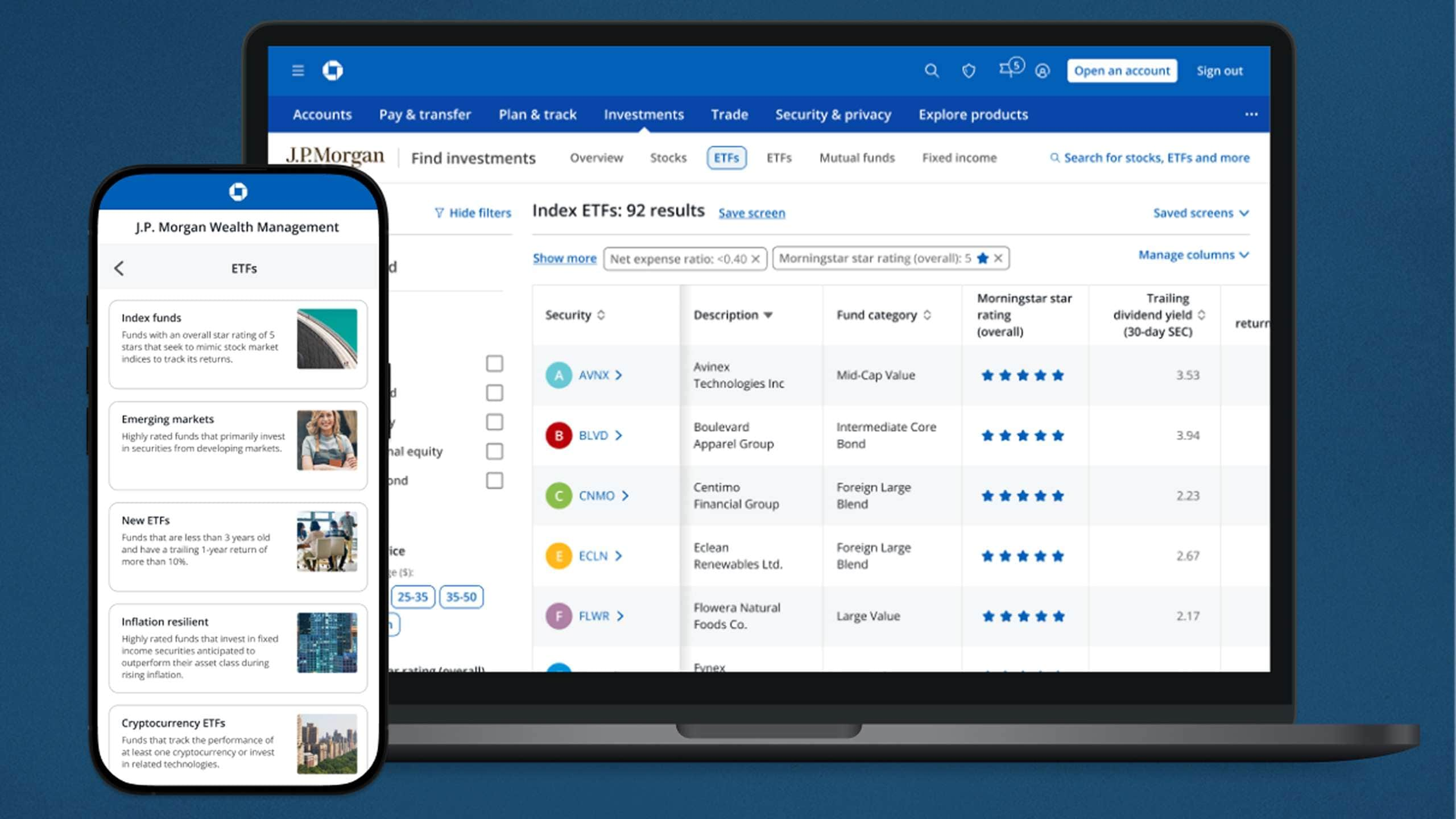Diversify your investments with index ETFs
Adding index ETFs to your portfolio can offer the potential for increased flexibility, tax efficiency and liquidity when you invest. With J.P. Morgan, you can access a variety of index ETFs and enjoy unlimited $0 commission online trades.
Invest your way with J.P. Morgan, whether you want to invest on your own or with our advisors.
Index ETFs: at a glance
What are index ETFs?
Index ETFs are a type of exchange-traded fund (ETF) that aim to mimic the returns of a specific market index, or a basket of securities that represent a section of the financial market, like the S&P 500.
Why invest in index ETFs?
Like regular ETFs, index ETFs offer exposure to a diverse range of investments and sectors, and typically have lower expense ratios than mutual funds.
How do I invest in ETFs?
You can buy or sell index ETFs with a J.P. Morgan Self-Directed Investing account or work with a J.P. Morgan advisor.
A closer look at index ETFs
Diversification
ETFs offer baskets of investments encompassing a variety of securities across asset classes and sectors for a more diversified portfolio.
Lower fees
Most ETFs are passively managed, which means that they have lower expense ratios than funds that are actively managed like mutual funds.
Dividend reinvestment
Most index ETFs are eligible for dividend reinvestment within a J.P. Morgan Self-Directed Investing account.
Here’s how we can work together
Invest on your own
Build your investment portfolio on your own with unlimited $0 commission online trades. Footnote 1Opens overlay
Invest on your own
Build your investment portfolio on your own with unlimited $0 commission online trades. Footnote 1Opens overlay
Invest with our advisors
Work 1:1 with a J.P. Morgan advisor to receive tailored guidance and build a financial strategy based on what’s important to you.
Invest with our advisors
Work 1:1 with a J.P. Morgan advisor to receive tailored guidance and build a financial strategy based on what’s important to you.
More to explore
Frequently asked questions
Index Exchange Traded Funds (ETFs) are investment funds that are traded on stock exchanges, similar to individual stocks. They are designed to track the performance of a specific index, such as the S&P 500, by holding a portfolio of assets that replicate the index. Index ETFs offer a way to gain exposure to a broad market or sector with the benefits of diversification, lower costs and liquidity.
You can invest in index ETFs with a J.P. Morgan Self-Directed Investing account or with a J.P. Morgan advisor.
To invest on your own, search and invest in index ETFs in the Chase Mobile® app or at chase.com. It's important to review the fund's prospectus and understand the associated fees and risks before investing.
We offer commission-free online trading on ETFs, including index ETFs.
There are costs associated with owning ETFs. Before investing in ETFs, you should consider the funds' investment objectives, risks, charges and expenses. Contact the client service center for a prospectus or, if available, a summary prospectus containing this information. Read it carefully. ETFs are subject to market fluctuation and the risks of their underlying investments; ETFs are also subject to management fees and other expenses. Unlike mutual funds, ETF shares are bought and sold at market price, which may be higher or lower than their net asset value (NAV), and are not individually redeemed from the fund.
Investing in an index ETF involves purchasing shares of a fund that aims to replicate the performance of a specific market index, offering diversification and liquidity similar to individual stocks. Directly investing in a market index is not possible, as indexes are theoretical constructs and cannot be bought or sold. Index ETFs provide a practical way to gain exposure to the entire index, allowing you to benefit from its overall performance. Additionally, index ETFs may offer advantages such as lower costs and tax efficiency compared to other investment vehicles. They are designed to match the returns of the index they track, rather than attempting to outperform it.
